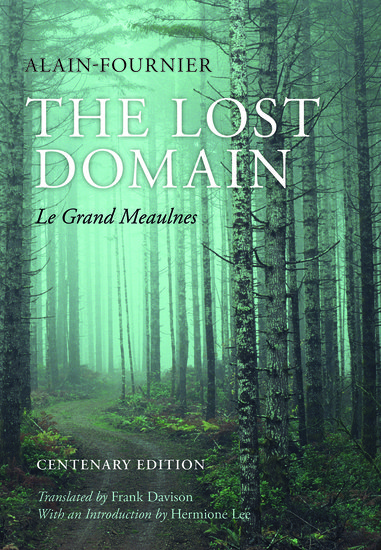Alain-Fournier’s lyrical novel, The Lost Domain, captures the painful transition from adolescence to adulthood without sentimentality, and with heart-wrenching yearning. Romantic and fantastical, it is the story’s ultimate truthfulness about human experience that has captivated readers for a hundred years. The following is an extract from chapter 15 and describes the moment when Meaulnes sees Yvonne de Galais for the first time.
Roaming through the garden, he came upon the fishpond and peered over the rickety fence which surrounded it. The pool was still edged with ice, thin and lacy like foam. He caught sight of himself in the water, as if he were bending over the sky. And in the figure dressed in the clothes of a romantic student he saw another Meaulnes: not the collegian who had made off in a farmer’s carriole, but a charming and fabulous creature out of a book, a book one might receive as a prize…
For some time he strolled along the shore over a sandy stretch that resembled a towpath, stopping here and there to stare up at tall dusty windows through which apartments in a state of dilapidation could be dimly seen, or lumber-rooms cluttered up with wheelbarrows, rusty tools, and broken flowerpots, when all at once he heard footsteps on the sand.
It was two women, one old and bent, the other young, fair, and slender. Her inconspicuous clothes, simple but charming, after all the fancy costumes of the night before, struck him at first as extraordinary.
They paused for a moment to look about them and Meaulnes, in a hasty conclusion that later seemed to him wildly wide of the mark, told himself:
‘Probably one of those girls they call eccentric — perhaps an actress they’ve got here for the fête.’
Meanwhile the two women passed close to him, and he stood watching the girl. Often afterwards, when he had gone to sleep after trying desperately to recapture that beautiful image, he saw in his dreams a procession of young women who resembled her. One wore a hat like hers; one leaned slightly forward as she did; one had her innocent expression, another her slim waist, another her blue eyes — but not one of them was this tall slender girl. He had time to notice a head of luxuriant fair hair and a face with small features so delicate as to be almost over-sensitive. Then she was moving away from him and he noticed the clothes she was wearing which were as simple and modest as garments could possibly be…

Irresolute, wondering whether he dare accompany them, he heard the girl say to her companion, as she turned slightly towards him:
‘The boat ought to be here at any moment now…’
And Meaulnes followed them. The old lady, though feeble and shaky, did most of the talking which she sprinkled with laughter, the girl making gentle replies. And the same gentleness was in the look, innocent and serious, which she turned on him as the two women walked down towards a landing-stage: a look which seemed to say:
‘Who are you? How do you happen to be here? I don’t know you… And yet I do seem to know you.’
Other guests were now standing about under the trees. Then three pleasure-boats came alongside to take on the passengers. One by one young men doffed their hats and young ladies bowed at the approach of the two women, who seemed to be the lady of the château and her daughter. It was all very strange — the morning itself, the excursion… In spite of the sun there was a chill in the air and the women drew more tightly about their throats the feather boas which were then in fashion…
The old lady stayed behind on the shore, and without knowing how it happened, Meaulnes found himself on board the same little vessel as the young lady of the house. He leaned against a rail, one hand protecting his hat from the high wind, unable to take his eyes from the girl, who had found a seat in a sheltered part of the deck. She looked at him too. She would answer the remarks of her neighbours with a smile, then her blue eyes would rest on him gently. He noticed that she had a habit of biting her lip.
In deep silence they drew away from the shore. Nothing could be heard but the purr of the engine and the wash from the bows. It might have been a morning of midsummer. They might have been bound for some country estate where this girl would saunter under a white sunshade, doves cooing through the long afternoon… But an icy gust of wind brought a sharp reminder of December to the people taking part in this strange fête.
Alain-Fournier was the pseudonym of Henri Alban-Fournier, whose only novel, Le Grand Meaulnes (The Lost Domain) was published the year before he was killed in action in 1914, at the age of 27. Like the narrator of his novel, Alain-Fournier was the son of a schoolteacher, and a chance meeting with a girl on the banks of the Seine became the rite of passage that inspired his story.
Subscribe to the OUPblog via email or RSS.
Subscribe to only literature articles on the OUPblog via email or RSS.
Image credit: Alain Fournier as a child. Public domain via WikiCommons.



Recent Comments
There are currently no comments.